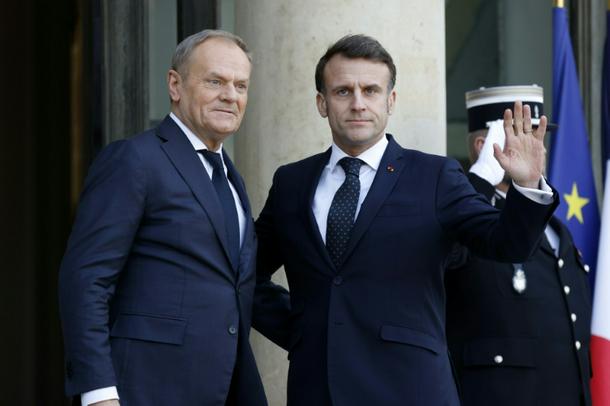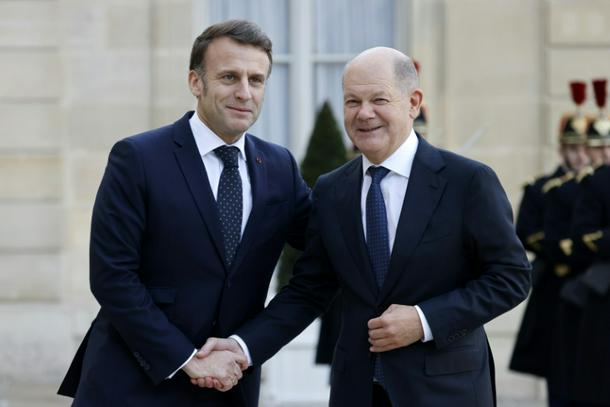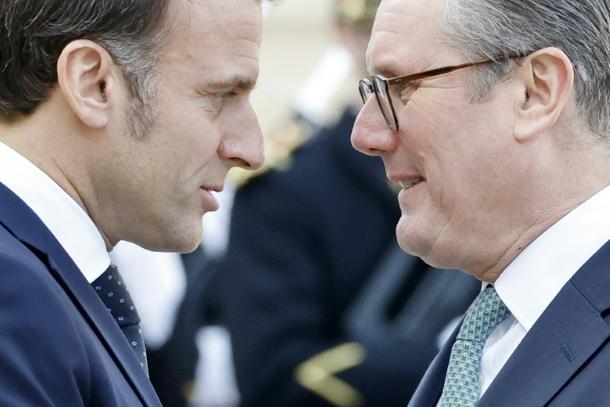
Polish Prime Minister Donald Tusk (L), pictured with French President Emmanuel Macron, said that he would urge European leaders at the emergency meeting to 'immediately' boost Europe's defences
Paris (AFP) - European leaders Monday sought to overcome differences at emergency Paris talks on responding to a shock policy shift on the war in Ukraine by the new US administration of Donald Trump, as Germany bristled at suggestions troops could be deployed.
With European policymakers still reeling from US Vice President JD Vance’s withering attack on the European Union at the annual Munich Security Forum, key leaders attended the meeting at the Elysee Palace called at the last minute by President Emmanuel Macron.
In the most concrete sign yet of the US policy shift, Washington and Moscow’s top diplomats on Tuesday were due to have the first such face-to-face meeting since Russia invaded Ukraine in February 2022, a clear sign that Trump wants to bring Russian President Vladimir Putin in from the cold.
Facing one of their biggest challenges in years, European leaders fear that Trump wants to make peace with Russia in talks that will not even involve Kyiv, let alone the European Union.
They now need to weigh measures including ramping up defence spending to be less dependent on the US, to sending troops to Ukraine as peacekeepers when a ceasefire is agreed.
Macron held telephone talks with Trump just before the summit, the French presidency said.
“Europe’s security is at a turning point,” EU commission chief Ursula von der Leyen wrote on X.
“Yes, it is about Ukraine – but it is also about us,” she said, calling for a “surge” on defence spending.
- ‘A little irritated’ -

Germany's Chancellor Olaf Scholz said he was 'a little irritated' by suggestions of sending troops
UK Prime Minister Keir Starmer, aware of the importance of London showing commitment to European security after Brexit, on Sunday said that he was willing to put “our own troops on the ground if necessary” in response to what he called “a once-in-a-generation moment for the collective security of our continent”.
But after the talks German Chancellor Olaf Scholz said that any debate now on sending peacekeepers to Ukraine was “completely premature” and “highly inappropriate” while the war is ongoing.
Scholz said he was “a little irritated” about the debate “at the wrong time and on the wrong topic”.
Spain’s foreign minister, Jose Manuel Albares, said that, while it was necessary for Europeans to meet and prepare decisions, “nobody is currently planning to send troops to Ukraine, especially because peace is still far off”.
- ‘Take practical steps’ -
Macron has described Trump’s return for a second term in the White House as an “electroshock” but also warned against any peace deal that could amount to “capitulation”.
Polish Prime Minister Donald Tusk, another key participant, on Monday said that he would urge European leaders at the emergency summit to “immediately” boost Europe’s defences, warning that they do not match Russia’s.
“We will not be able to effectively help Ukraine if we do not immediately take practical steps regarding our own defence capabilities,” Tusk told reporters before the talks.
French newspaper Le Monde said the rupture between Europe and the United States was “historic”, but added that Europe had to show its capacity to ensure its own defence.
“European blindness came to an abrupt end in Munich. From now on, the security of the continent depends essentially on the Europeans themselves, and on their ability to maintain their unity,” it added.
- ‘Process to peace’ -

Britain's Prime Minister Keir Starmer has said London could send troops
The Paris talks come as Washington said that Secretary of State Marco Rubio, National Security Advisor Mike Waltz and Special Envoy Steve Witkoff on Tuesday would meet a Russian delegation including Foreign Minister Sergei Lavrov in Riyadh, ahead of a future meeting between Trump and Putin in the Saudi capital.
Rubio had earlier sought to play down expectations of any breakthrough at upcoming talks with Russian officials.
“A process towards peace is not a one-meeting thing,” he told the CBS network.
Ukrainian President Volodymyr Zelensky was to visit Saudi Arabia on Wednesday, one day after the meeting between top US and Russian officials.
Zelensky last week had announced the trip along with stops in the United Arab Emirates and Turkey without giving dates, adding that he had no plans to meet Russian or US officials.
“There must be no division of security and responsibility between Europe and the United States,” Scholz said in Paris.
“NATO is based on us always acting together and sharing the risk, thereby guaranteeing our security. This must not be called into question.”